
Potsdam: The Enchanting Jewel of Brandenburg
Potsdam, the capital city of Brandenburg, is a picturesque destination known for its rich history, stunning palaces, and beautiful parks. Just a short train ride from Berlin, this charming city offers a delightful blend of cultural heritage and natural beauty. The city's most famous attraction is the Sanssouci Palace, often referred to as the 'Prussian Versailles.' This magnificent palace, surrounded by beautifully landscaped gardens, was the summer residence of Frederick the Great. A walk through the palace's opulent rooms and gardens offers a glimpse into the grandeur of the 18th century. Potsdam is also home to the Dutch Quarter, a unique neighborhood with red-brick houses that give it a distinct charm. This area is perfect for a leisurely stroll, and you can explore quaint shops, cafes, and galleries. For history enthusiasts, the Cecilienhof Palace is a must-visit. This historical site is where the Potsdam Conference took place in 1945, marking a significant moment in world history. Nature lovers will enjoy the many parks and lakes in and around Potsdam. The Neuer Garten and Babelsberg Park are ideal for relaxing walks and picnics. Don't miss the chance to visit the Filmpark Babelsberg, where you can learn about the city's cinematic history and enjoy interactive exhibits. With its blend of history, culture, and natural beauty, Potsdam is a destination that promises to captivate and inspire every visitor.
Local tips in Potsdam
- Visit Sanssouci Palace early in the morning to avoid crowds and enjoy a peaceful tour.
- Take a guided walking tour of the Dutch Quarter to learn about its unique history and architecture.
- Rent a bike to explore the city's extensive network of parks and lakes at your own pace.
- Check the schedule for events at the Filmpark Babelsberg, especially if you are traveling with children.
- Try local specialties at the Potsdam farmers' market, held weekly in the city center.
Potsdam: The Enchanting Jewel of Brandenburg
Potsdam, the capital city of Brandenburg, is a picturesque destination known for its rich history, stunning palaces, and beautiful parks. Just a short train ride from Berlin, this charming city offers a delightful blend of cultural heritage and natural beauty. The city's most famous attraction is the Sanssouci Palace, often referred to as the 'Prussian Versailles.' This magnificent palace, surrounded by beautifully landscaped gardens, was the summer residence of Frederick the Great. A walk through the palace's opulent rooms and gardens offers a glimpse into the grandeur of the 18th century. Potsdam is also home to the Dutch Quarter, a unique neighborhood with red-brick houses that give it a distinct charm. This area is perfect for a leisurely stroll, and you can explore quaint shops, cafes, and galleries. For history enthusiasts, the Cecilienhof Palace is a must-visit. This historical site is where the Potsdam Conference took place in 1945, marking a significant moment in world history. Nature lovers will enjoy the many parks and lakes in and around Potsdam. The Neuer Garten and Babelsberg Park are ideal for relaxing walks and picnics. Don't miss the chance to visit the Filmpark Babelsberg, where you can learn about the city's cinematic history and enjoy interactive exhibits. With its blend of history, culture, and natural beauty, Potsdam is a destination that promises to captivate and inspire every visitor.
When is the best time to go to Potsdam?
Iconic landmarks you can’t miss
Sanssouci Park
Discover the historical beauty and serene landscapes of Sanssouci Park in Potsdam, a UNESCO World Heritage site perfect for all nature lovers and history enthusiasts.
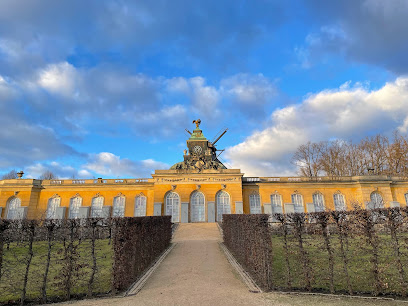
Sanssouci Palace
Explore the beauty and history of Sanssouci Palace, an iconic landmark in Potsdam, showcasing stunning architecture and lush gardens.
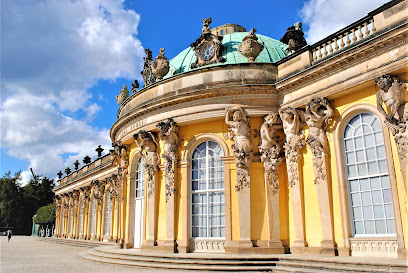
Brandenburg Gate
Explore the Brandenburg Gate in Potsdam, a stunning historical landmark symbolizing German unity and architectural beauty.
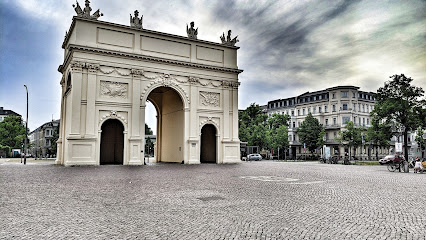
New Palace
Explore the New Palace in Potsdam, a UNESCO World Heritage site showcasing Baroque architecture, rich history, and beautiful gardens.
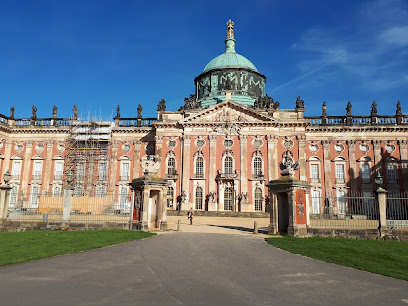
New Garden
Experience the enchanting blend of nature and history at New Garden, Potsdam's serene park featuring stunning landscapes and architectural wonders.
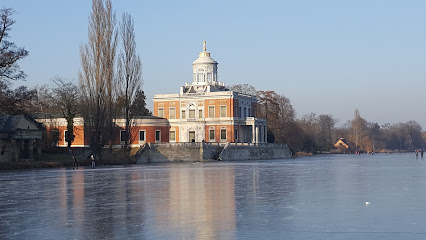
Cecilienhof
Explore the historical significance and stunning architecture of Cecilienhof, a castle and museum nestled in Potsdam's enchanting New Garden.
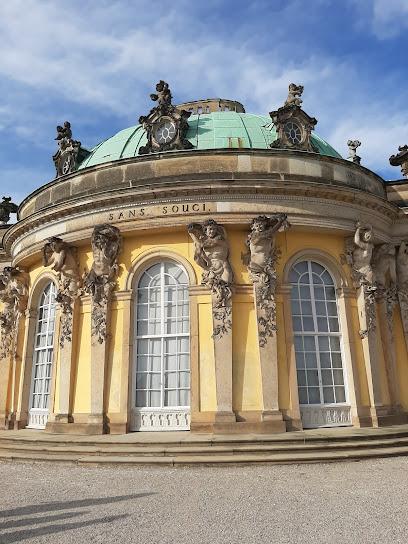
Dutch Quarter
Explore Potsdam's Dutch Quarter, a historical gem featuring unique architecture, local culture, and delightful cafes in the heart of Germany.
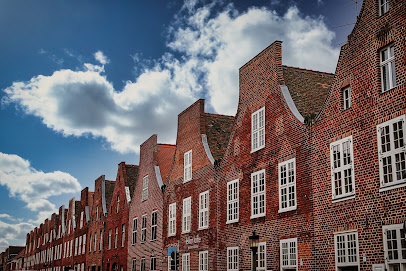
Chinese House in Sanssouci Park
Discover the charm of the Chinese House in Sanssouci Park, a historical landmark blending Eastern and Western architecture amidst stunning gardens.
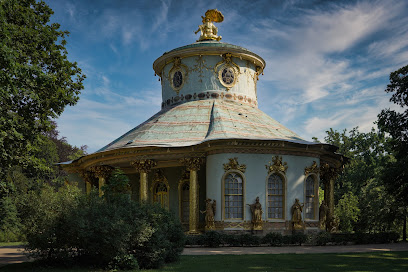
Schlosspark Sanssouci
Experience the majestic beauty of Schlosspark Sanssouci, a historic park in Potsdam featuring stunning gardens, palaces, and rich cultural heritage.
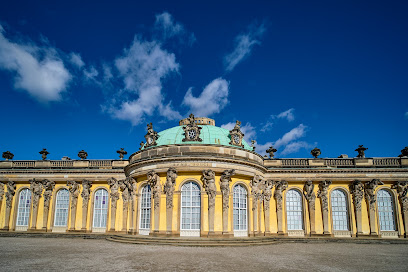
Orangery Palace
Discover the enchanting beauty of the Orangery Palace, a historical landmark in Potsdam showcasing exquisite architecture and rich cultural heritage.
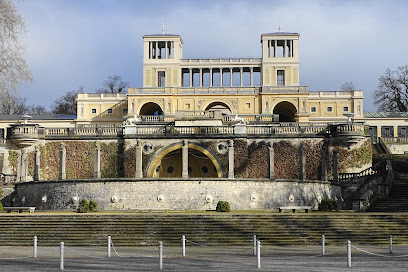
Museum Alexandrowka
Discover the cultural harmony of Russia and Germany at Museum Alexandrowka, a historical gem in Potsdam's picturesque landscape.
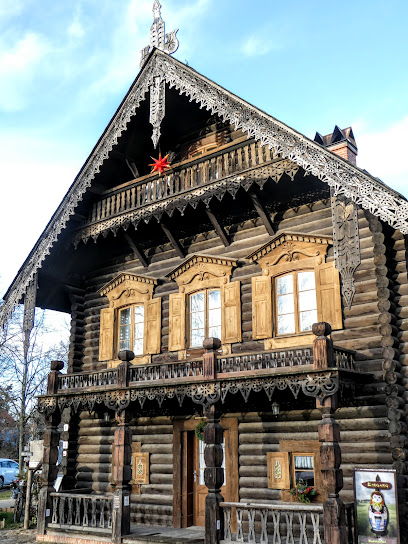
Belvedere Castle on the Pfingstberg
Explore the enchanting Belvedere Castle on the Pfingstberg in Potsdam, a historical gem with breathtaking views and lush gardens that captivate every visitor.
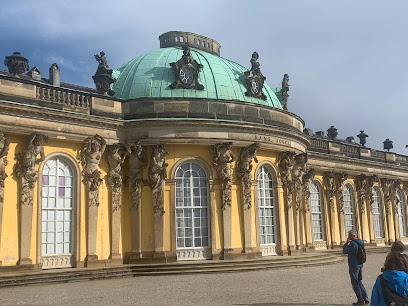
St. Nicholas' Church, Potsdam
Explore the breathtaking St. Nicholas' Church in Potsdam, a stunning neoclassical architectural marvel and serene tourist attraction.
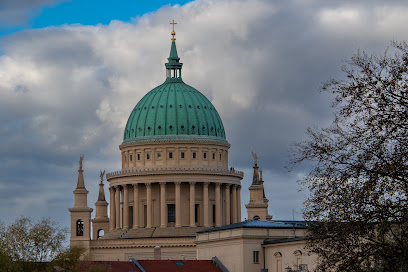
Filmmuseum Potsdam
Experience the captivating world of cinema at Filmmuseum Potsdam, a treasure trove of film history and innovation in Germany.
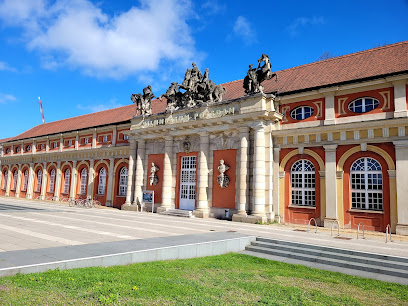
Church of Peace
Explore the Church of Peace in Potsdam, a stunning Protestant church blending historical significance and architectural beauty amid serene gardens.
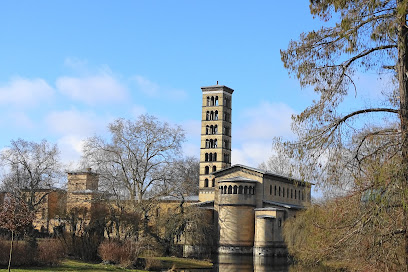
Unmissable attractions to see
Alexanderplatz
Discover the vibrant Alexanderplatz in Berlin, a historic square blending culture, shopping, and dining in the heart of the city.
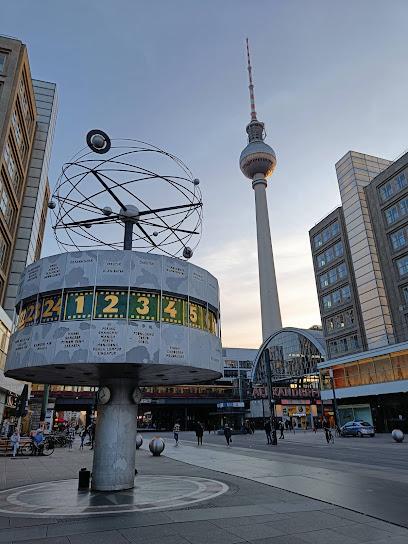
Berlin Zoological Garden
Explore the enchanting Berlin Zoological Garden, home to thousands of animals and a commitment to wildlife conservation in the heart of Berlin.

Berlin TV Tower
Experience Berlin from above at the iconic TV Tower, where history meets stunning panoramic views and a delightful dining experience.
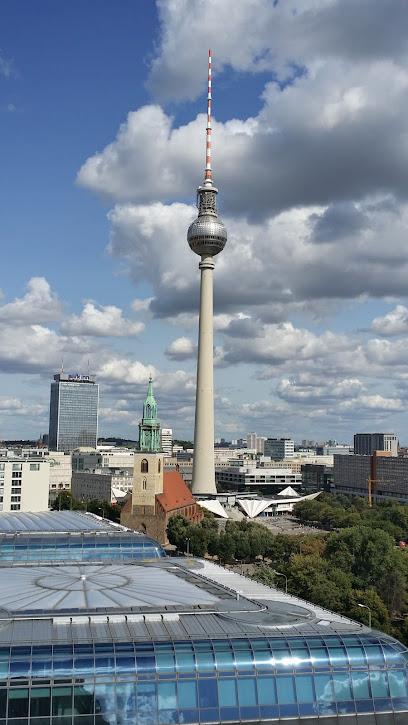
Berlin Cathedral
Explore the breathtaking Berlin Cathedral, a stunning Baroque masterpiece in the heart of Berlin, showcasing rich history and stunning artistry.
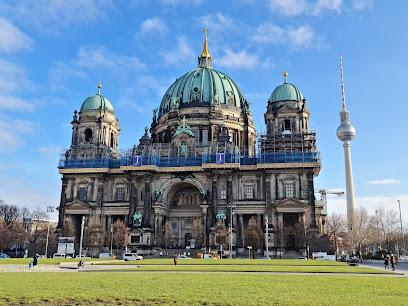
Olympiastadion Berlin
Explore Olympiastadion Berlin, a historic sports venue offering rich heritage, stunning architecture, and a vibrant atmosphere for all visitors.
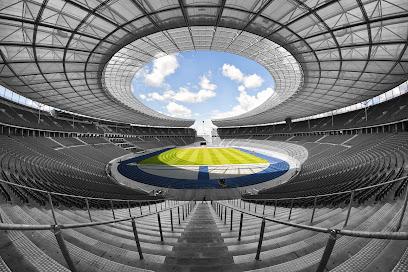
Topography of Terror
Explore the Topography of Terror in Berlin, a poignant museum dedicated to the history of Nazi Germany and the Holocaust, fostering reflection and understanding.
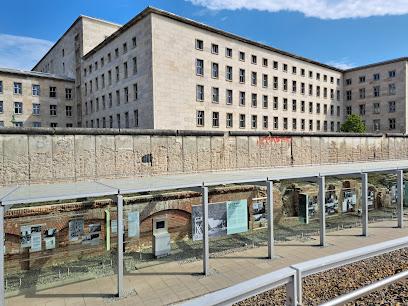
Sanssouci Park
Explore the enchanting beauty of Sanssouci Park in Potsdam, a UNESCO World Heritage site rich in history and stunning landscapes.
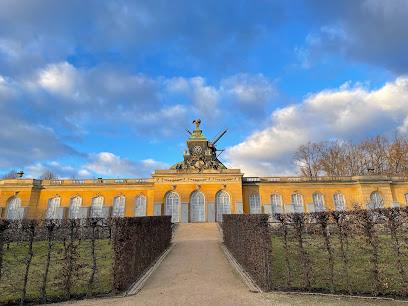
Uber Arena
Experience the pulse of Berlin at Uber Arena, where unforgettable concerts, thrilling sports, and vibrant events unite.
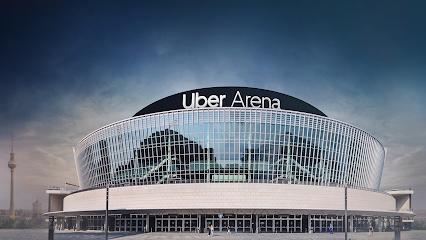
Pergamonmuseum
Explore the Pergamonmuseum in Berlin, a UNESCO World Heritage site showcasing extraordinary artifacts from ancient civilizations and breathtaking architectural wonders.
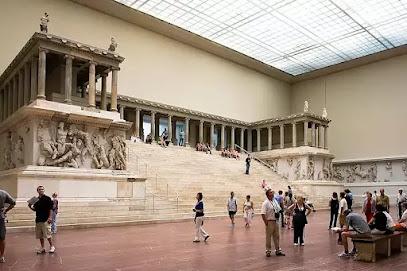
Charlottenburg Palace
Explore the majestic Charlottenburg Palace in Berlin, a historical landmark showcasing exquisite baroque architecture and stunning royal gardens.

Sanssouci Palace
Discover the majestic Sanssouci Palace in Potsdam, a UNESCO World Heritage site showcasing stunning Rococo architecture and beautiful gardens.
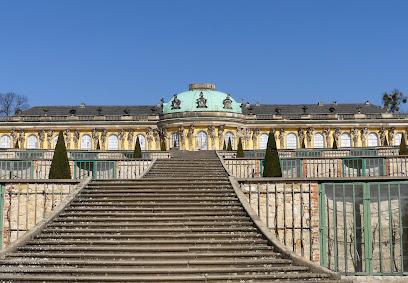
Tiergarten
Explore the lush landscapes and historical monuments of Tiergarten, Berlin's iconic park, offering a serene escape in the heart of the city.

German Museum of Technology
Discover the wonders of innovation and technology at the German Museum of Technology in Berlin, where history meets modernity.
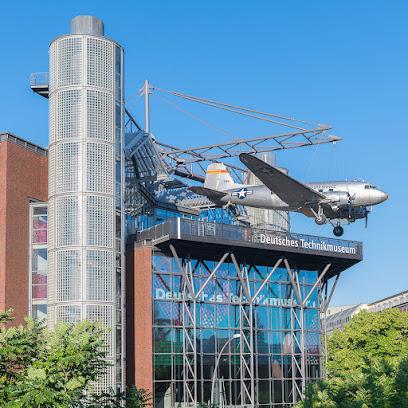
Kaiser Wilhelm Memorial Church
Experience the historic Kaiser Wilhelm Memorial Church, a stunning blend of resilience and architecture in the heart of Berlin, symbolizing peace and hope.
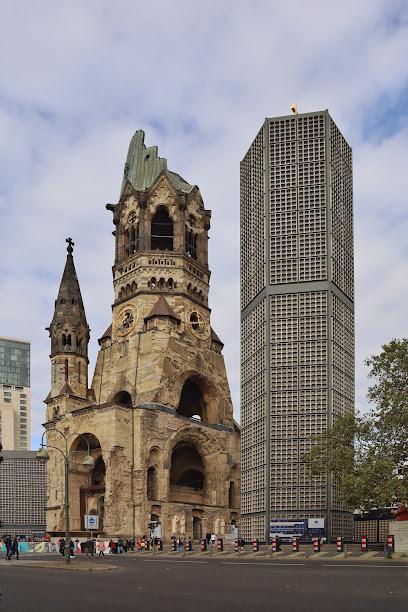
DDR Museum
Discover the everyday life and history of East Germany at the DDR Museum in Berlin, where interactive exhibits bring the past to life.
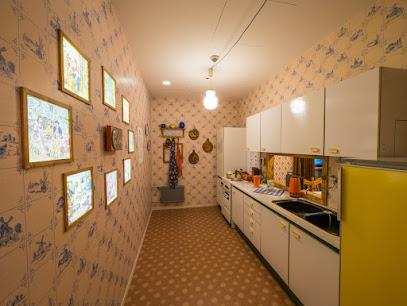
Essential places to dine
PETER PANE Burgergrill & Bar
Experience gourmet burgers and vibrant atmosphere at PETER PANE Burgergrill & Bar in Potsdam - perfect for meat lovers and vegetarians alike!
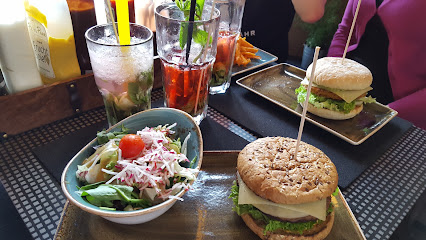
L'Osteria
Experience authentic Italian cuisine at L'Osteria in Potsdam - where every meal feels like a celebration.
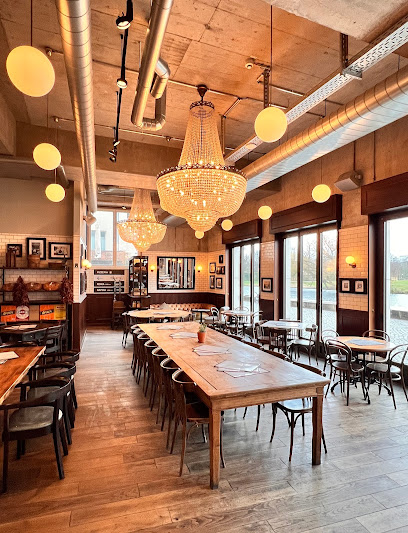
Chi Keng
Experience the best of Asian cuisine at Chi Keng in Potsdam with exquisite sushi and innovative Pan-Asian dishes in an elegant setting.
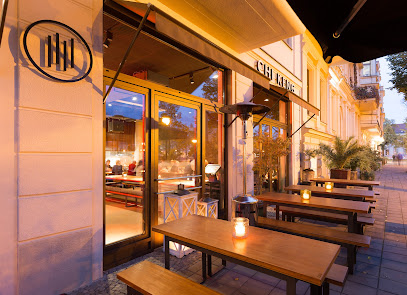
Herr Dang
Discover authentic Vietnamese flavors and exquisite sushi in Potsdam at Herr Dang – a culinary gem offering delightful dishes in a cozy setting.
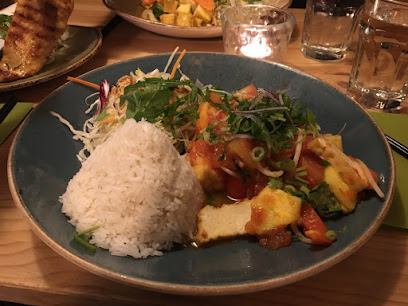
Restaurant El Puerto
Experience authentic Mediterranean flavors at Restaurant El Puerto in Potsdam - a delightful destination for food lovers.
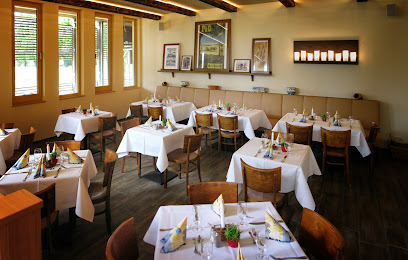
Masala Haus
Experience authentic Indian cuisine at Masala Haus in Potsdam – where every dish tells a story filled with rich flavors and cultural heritage.
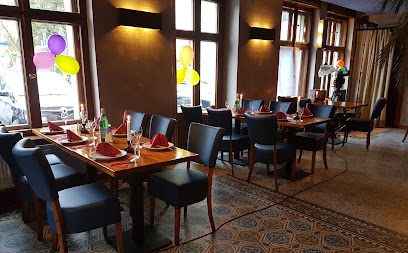
Restaurant Laila
Experience authentic Persian and Middle Eastern cuisine at Restaurant Laila in Potsdam – where every dish tells a story.
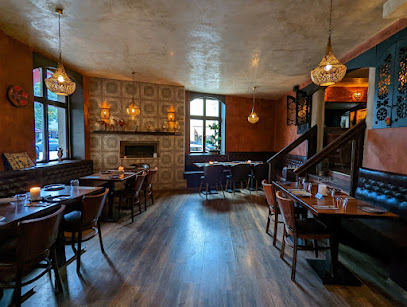
Trattoria Toscana Potsdam
Savor authentic Italian flavors at Trattoria Toscana Potsdam – where every dish tells a story.
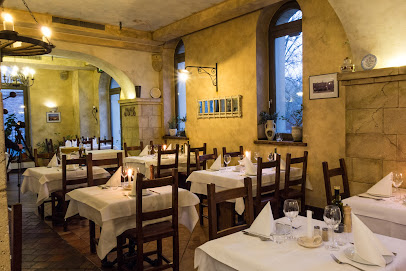
Waikiki Burger
Experience delicious American-style burgers at Waikiki Burger in Potsdam – a must-visit for food lovers seeking comfort food.

Matador
Experience exceptional steaks and delightful cocktails at Matador in Potsdam – where culinary excellence meets vibrant atmosphere.
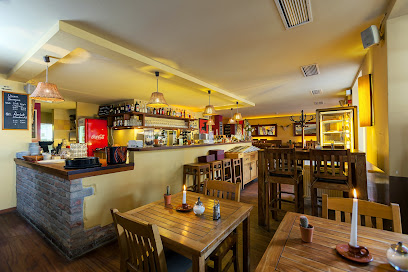
Restaurant Zur Historischen Mühle
Experience the fusion of history and gastronomy at Restaurant Zur Historischen Mühle in Potsdam—where every meal tells a story.
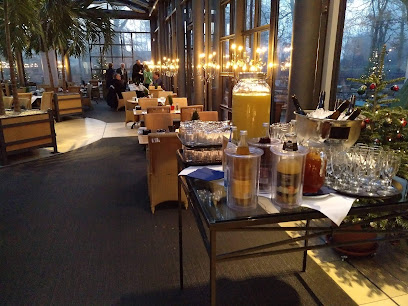
Spiti Mas - Griechisches Restaurant
Discover authentic Greek flavors at Spiti Mas in Potsdam - where every meal feels like a festive gathering.
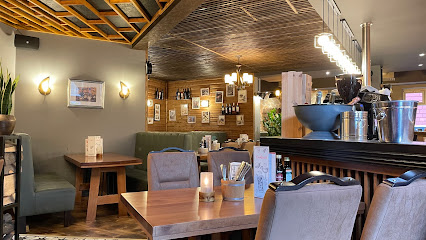
Zum Fliegenden Holländer
Experience authentic German cuisine at Zum Fliegenden Holländer in Potsdam - where tradition meets taste.
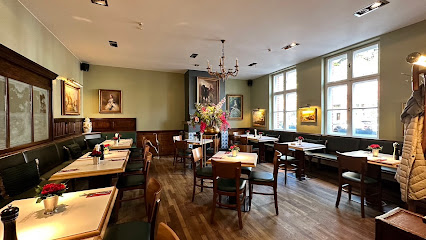
Anna Amalia
Experience authentic German cuisine in Potsdam at Anna Amalia—where tradition meets taste amidst charming surroundings.
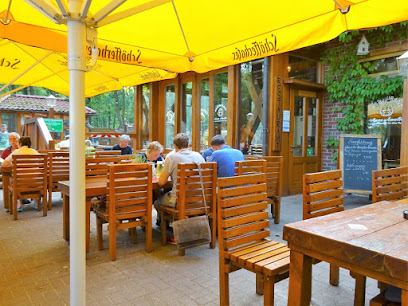
Zur Linde / Potsdam
Experience authentic German cuisine at Zur Linde in Potsdam - where tradition meets flavor in a cozy setting.
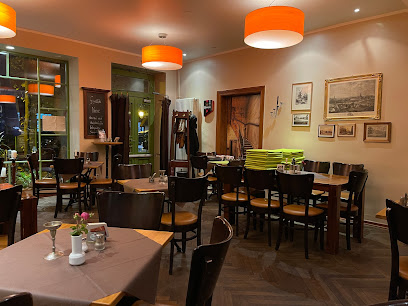
Markets, malls and hidden boutiques
Stern-Center Potsdam
Explore the vibrant Stern-Center Potsdam, a shopping haven with diverse stores, dining options, and lively atmosphere, perfect for all visitors.
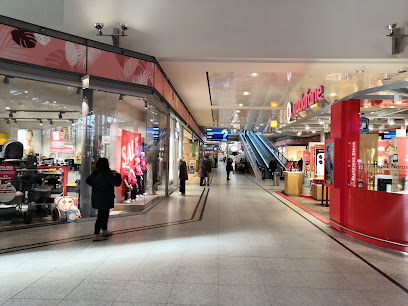
Bahnhofspassagen Potsdam
Discover Bahnhofspassagen Potsdam: A bustling shopping mall filled with brands, local delights, and a lively atmosphere in the heart of the city.
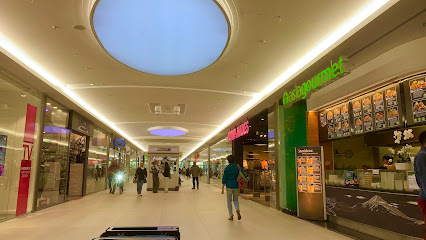
GALERIA Potsdam Stadtpalais
Explore GALERIA Potsdam Stadtpalais: Your Ultimate Shopping Destination in the Heart of Potsdam with Fashion, Home Goods & More!
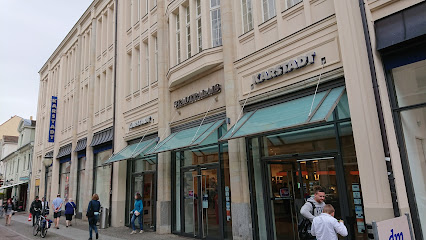
Markt CENTER
Explore the vibrant Markt CENTER in Potsdam, a shopping paradise offering diverse retail and dining experiences in a welcoming atmosphere.
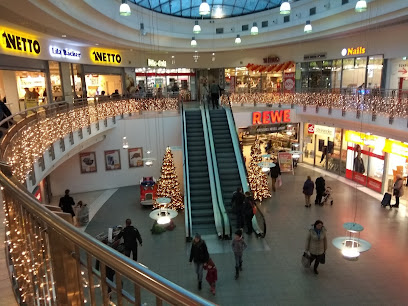
Wilhelmgalerie
Experience shopping, dining, and vibrant culture at the Wilhelmgalerie, Potsdam's premier shopping destination.

Lindt Boutique Potsdam
Explore the exquisite world of Lindt Boutique Potsdam, where chocolate dreams come true with every delicious bite.
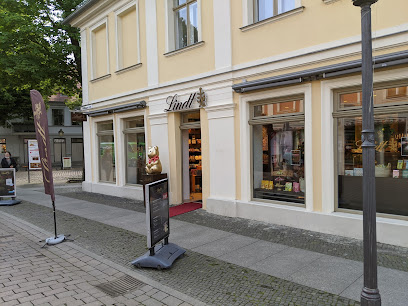
Luisenforum
Discover the vibrant shopping experience at Luisenforum, Potsdam's leading mall, where retail meets dining and entertainment.
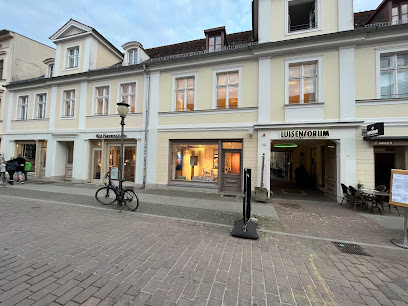
Chèvrefeuille
Discover Chèvrefeuille in Potsdam, a chic clothing store offering a curated selection of stylish apparel and accessories for every fashion enthusiast.
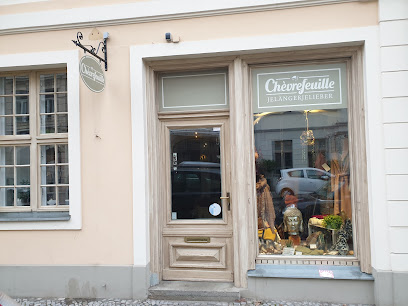
Neues Palais - Museum Shop
Explore the Neues Palais Museum Shop for unique souvenirs and greeting cards in the heart of Potsdam's Park Sanssouci.
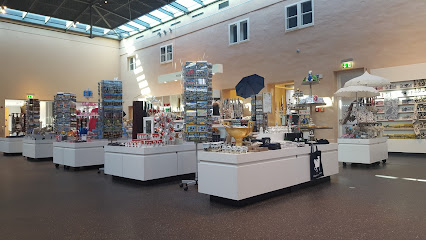
ah & oh - BOUTIQUE CAFÉ
Discover Potsdam's ah & oh - BOUTIQUE CAFÉ, a chic blend of women's fashion and cozy café culture in the city's heart.
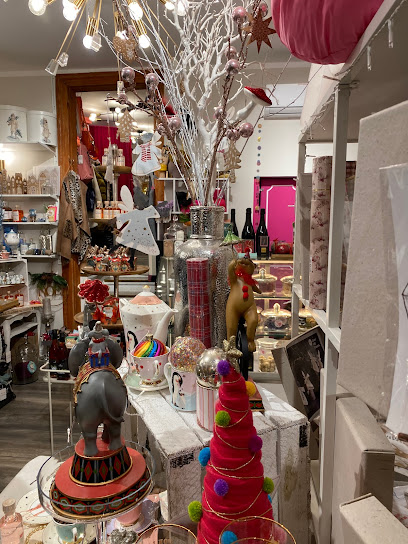
Balloom Design Boutique Atelier
Explore unique fashion at Balloom Design Boutique Atelier in Potsdam, where craftsmanship meets contemporary style for an unforgettable shopping experience.
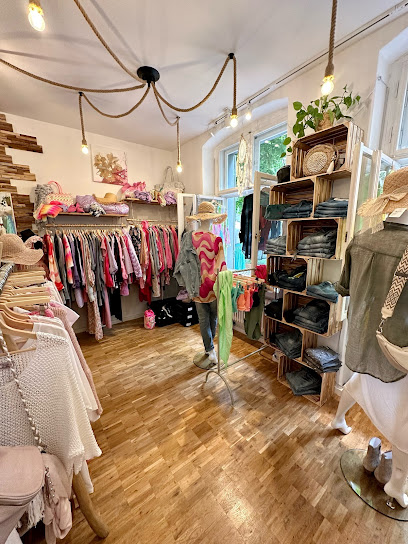
AUST Fashion Potsdam
Discover the charm of AUST Fashion Potsdam, a boutique offering unique clothing and accessories in the heart of the city, perfect for every fashion lover.
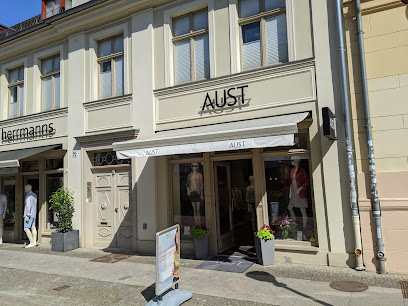
angelina's fashion & lifestyle I Mode I Schmuck I Accessoires
Explore Angelina's Fashion & Lifestyle in Potsdam for exquisite women's clothing, accessories, and jewelry in a stylish and inviting atmosphere.
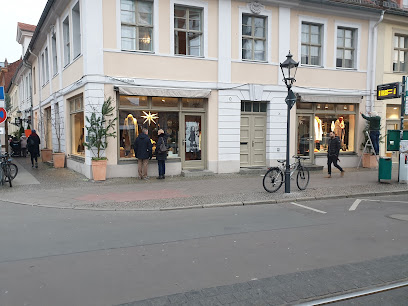
Feentraum GmbH
Explore Feentraum GmbH in Potsdam for unique gifts, stylish accessories, and a cozy café experience in a charming shopping destination.
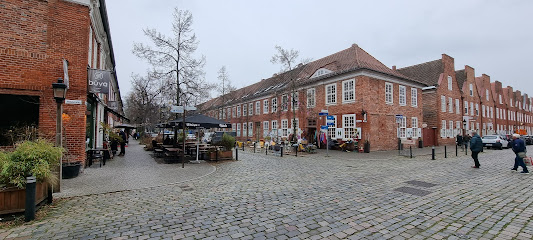
MiaZAYA
Explore MiaZAYA in Potsdam for trendy and affordable fashion for both men and women, right in the heart of the city.
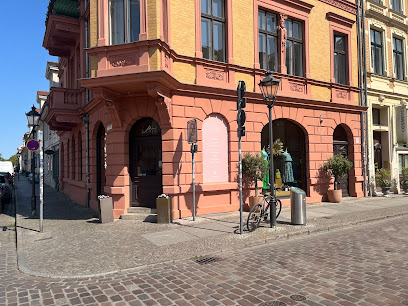
Essential bars & hidden hideouts
Kneipe Hafthorn
Experience the heart of Potsdam at Kneipe Hafthorn, where traditional cuisine meets a lively pub atmosphere, perfect for tourists and locals alike.
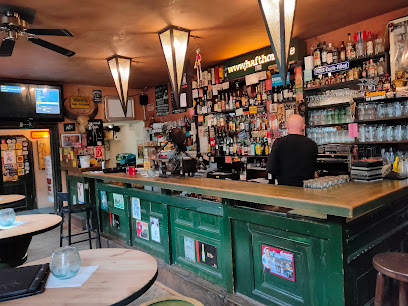
Bar Fritz'n
Experience the vibrant nightlife at Bar Fritz'n, Potsdam's premier cocktail bar and pub, where great drinks and a lively atmosphere await you.
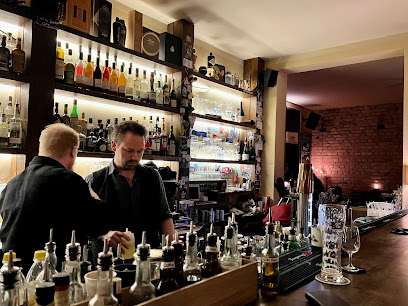
Bar Gelb - Potsdam
Experience Potsdam's nightlife at Bar Gelb, where exquisite cocktails and a charming beer garden await you in the heart of the city.
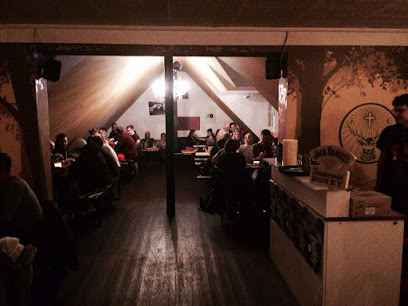
Pub à la Pub Studierendenkneipe
Discover the dynamic nightlife at Pub à la Pub in Potsdam, where vibrant music, affordable drinks, and a welcoming atmosphere await you.
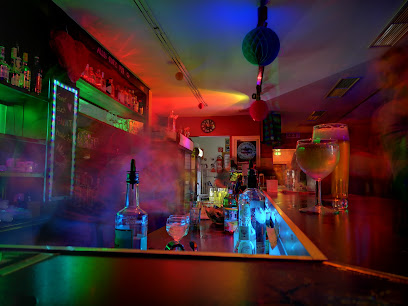
Waschbar
Experience the vibrant nightlife of Potsdam at Waschbar, where great drinks and a lively atmosphere await you.
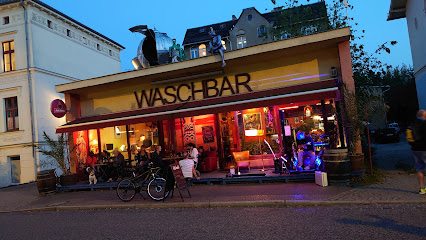
ShamRock's - Irish Pub Potsdam
Immerse yourself in an authentic Irish experience at ShamRock's Irish Pub in Potsdam, where great food, drinks, and live music await.
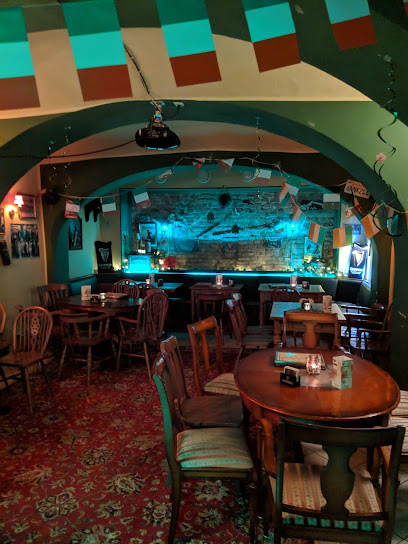
Happy Hour Dart & Poolbillard Bar
Experience the thrill of darts and pool at Happy Hour Dart & Pool Billard Bar in Potsdam, where fun meets great cocktails and friendly competition.
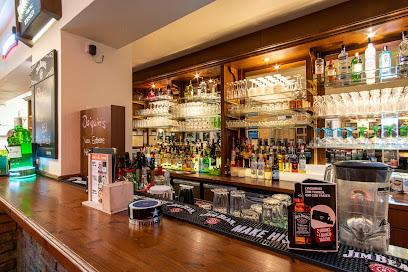
Da Vinci Lounge Potsdam
Experience the vibrant nightlife of Potsdam at Da Vinci Lounge, where exquisite cocktails meet a lively hookah bar atmosphere.
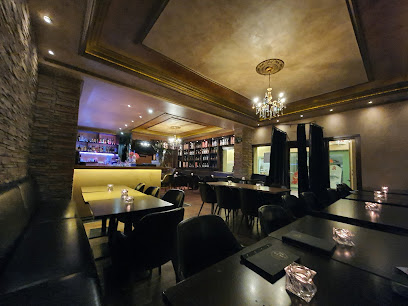
Shisha-Bar The Nubis
Experience the vibrant atmosphere of Shisha-Bar The Nubis in Potsdam, where flavorful hookahs and crafted cocktails meet cultural charm.
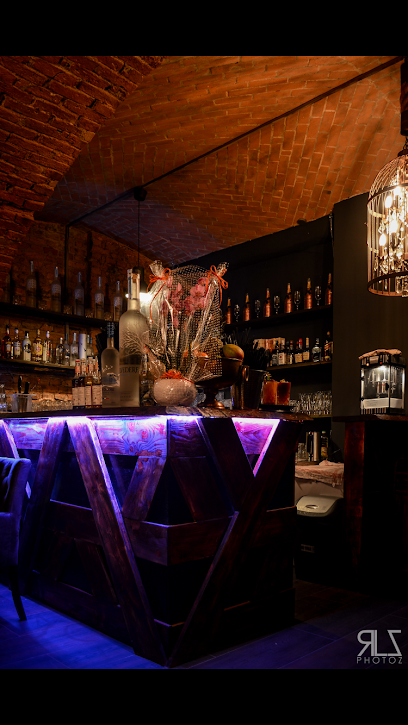
Unscheinbar - Potsdam
Discover the vibrant atmosphere of Unscheinbar, Potsdam's hidden bar gem with a delightful drink selection and a cozy ambiance.
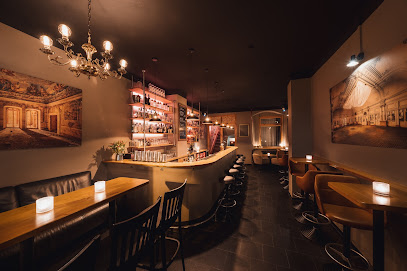
Cuhibar - Potsdam
Experience the vibrant culinary scene at Cuhibar in Potsdam, a delightful restaurant and cocktail bar offering exquisite dishes and drinks.
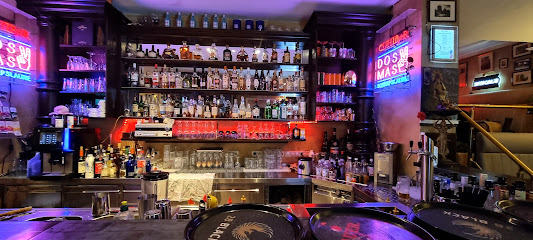
LaLeander Potsdam
Explore the vibrant atmosphere of LaLeander Potsdam, a must-visit bar and restaurant offering delightful cocktails and a diverse menu.
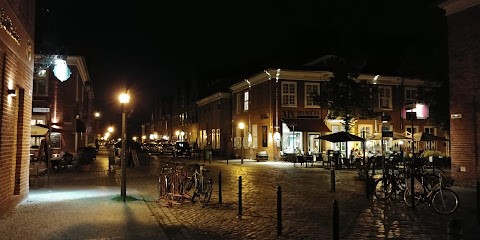
BAR-O-meter
Discover the energetic charm and exquisite cocktails of BAR-O-meter, a premier cocktail bar in the heart of Potsdam's nightlife.
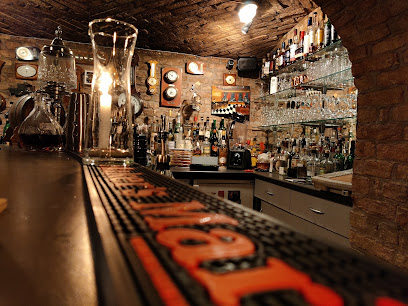
Happy Hour II
Discover the vibrant nightlife at Happy Hour II, Potsdam's premier cocktail bar offering a unique blend of classic and innovative drinks.
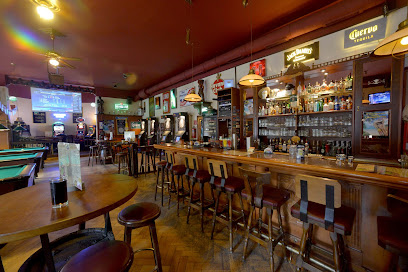
Local Phrases
-
- HelloHallo
[hah-loh] - GoodbyeAuf Wiedersehen
[owf vee-der-zay-en] - YesJa
[yah] - NoNein
[nine] - Please/You're welcomeBitte
[bit-teh] - Thank youDanke
[dahn-keh] - Excuse me/SorryEntschuldigung
[ent-shool-dih-goong] - How are you?Wie geht es Ihnen?
[vee gayt es in-en] - Fine. And you?Gut. Und Ihnen?
[goot oont in-en] - Do you speak English?Sprechen Sie Englisch?
[shpre-khen zee eng-lish] - I don't understandIch verstehe nicht
[ikh fer-shteh-eh nikht]
- HelloHallo
-
- I'd like to see the menu, pleaseIch möchte die Speisekarte sehen, bitte
[ikh merkh-teh dee shpay-zeh-kahr-teh zay-en, bit-teh] - I don't eat meatIch esse kein Fleisch
[ikh ess-eh kine fli-sh] - Cheers!Prost!
[prohst] - I would like to pay, pleaseIch möchte bezahlen, bitte
[ikh merkh-teh bet-tsah-len, bit-teh]
- I'd like to see the menu, pleaseIch möchte die Speisekarte sehen, bitte
-
- Help!Hilfe!
[hil-feh] - Go away!Geh weg!
[geh vehg] - Call the Police!Rufen Sie die Polizei!
[roo-fen zee dee po-lee-tsay] - Call a doctor!Rufen Sie einen Arzt!
[roo-fen zee i-nen ahrtst] - I'm lostIch habe mich verirrt
[ikh hah-beh meesh feh-rirt] - I'm illIch bin krank
[ikh bin krank]
- Help!Hilfe!
-
- I'd like to buy...Ich möchte kaufen...
[ikh merkh-teh kow-fen] - I'm just lookingIch schaue nur
[ikh show-eh noor] - How much is it?Wie viel kostet es?
[vee feel koss-tet es] - That's too expensiveDas ist zu teuer
[dahs ist tsoy toy-er] - Can you lower the price?Können Sie den Preis senken?
[kern-en zee den prees zeng-ken]
- I'd like to buy...Ich möchte kaufen...
-
- What time is it?Wie spät ist es?
[vee shpayt ist es] - It's one o'clockEs ist ein Uhr
[es ist iyn oor] - Half past (10)Halb zehn
[halb tsehn] - MorningMorgen
[mohr-gen] - AfternoonNachmittag
[nahk-mit-tahk] - EveningAbend
[ah-bent] - YesterdayGestern
[ges-tern] - TodayHeute
[hoi-teh] - TomorrowMorgen
[mohr-gen] - 1Eins
[ines] - 2Zwei
[tsvai] - 3Drei
[dry] - 4Vier
[fear] - 5Fünf
[foonf] - 6Sechs
[zeks] - 7Sieben
[zee-ben] - 8Acht
[ahkht] - 9Neun
[noyn] - 10Zehn
[tsehn]
- What time is it?Wie spät ist es?
-
- Where's a/the...?Wo ist ein/der...?
[vo ist iyn/dehr] - What's the address?Was ist die Adresse?
[vas ist dee ah-dreh-suh] - Can you show me (on the map)?Können Sie mir zeigen (auf der Karte)?
[kern-en zee meer tsai-gen (owf dehr kar-teh)] - When's the next (bus)?Wann kommt der nächste (Bus)?
[van komt dehr nekhs-teh (boos)] - A ticket (to ....)Eine Fahrkarte (nach ....)
[i-ne fahr-kar-teh (nakh)]
- Where's a/the...?Wo ist ein/der...?
History of Potsdam
-
Potsdam was first mentioned in a document in 993 AD as 'Poztupimi', a Slavic name. It started as a small fishing village and gradually developed over centuries. The city's strategic location along the Havel River contributed to its growth and significance.
-
One of the most defining periods in Potsdam's history was under the reign of Frederick II, also known as Frederick the Great. In the 18th century, he transformed Potsdam into a cultural and intellectual hub. The construction of Sanssouci Palace, his summer residence, marked this era. Sanssouci, meaning 'without concerns', is a masterpiece of Rococo architecture and reflects Frederick's love for art and philosophy.
-
Potsdam played a crucial role at the end of World War II when it hosted the Potsdam Conference in 1945. The Allied leaders—U.S. President Harry S. Truman, British Prime Minister Winston Churchill (later replaced by Clement Attlee), and Soviet Premier Joseph Stalin—met at Cecilienhof Palace to negotiate terms for the end of the war. The decisions made at this conference significantly shaped the post-war world order.
-
The Glienicke Bridge, connecting Potsdam with Berlin, became famously known as the 'Bridge of Spies' during the Cold War. It was the site of several high-profile exchanges of captured spies between the Eastern Bloc and the West. The bridge remains a powerful symbol of the era's espionage and tension.
-
The Dutch Quarter (Holländisches Viertel) in Potsdam is a unique architectural feature, built in the 18th century by Frederick William I to attract Dutch artisans to the city. The quarter consists of 134 red brick houses and represents one of the most significant examples of Dutch-style architecture outside the Netherlands.
-
Potsdam is often referred to as the 'Prussian Arcadia' due to its extensive and beautifully landscaped parks and palaces. The most notable is the Sanssouci Park, which includes the Sanssouci Palace, the New Palace, the Orangery Palace, and several other smaller structures. These sites collectively form the UNESCO World Heritage Site known as the 'Palaces and Parks of Potsdam and Berlin'.
-
Following the fall of the Berlin Wall in 1989 and the subsequent reunification of Germany in 1990, Potsdam underwent significant transformation. The city embraced its historical heritage while modernizing its infrastructure. Today, it stands as a vibrant cultural and educational center, home to numerous research institutes and the University of Potsdam.
Potsdam Essentials
-
Potsdam is located just 25 kilometers southwest of Berlin, making it easily accessible from the German capital. The nearest international airport is Berlin Brandenburg Airport (BER). From the airport, you can take a regional train (R1 or RE1) directly to Potsdam Hauptbahnhof (main station), which usually takes around 45 minutes. Alternatively, Potsdam can be reached by car via the A115 Autobahn, or by taking a bus from Berlin's central bus station.
-
Potsdam has an efficient public transportation system comprising buses, trams, and regional trains. The Verkehrsverbund Berlin-Brandenburg (VBB) operates the network, and single tickets or day passes can be purchased. Biking is also a popular option, with numerous bike rental stations and well-marked bike lanes. Taxis and ride-sharing services like Uber are available but generally more expensive. For those who prefer driving, car rentals are widely available.
-
The official currency in Germany is the Euro (EUR). Credit and debit cards are widely accepted, especially in hotels, restaurants, and larger shops. However, smaller establishments and some local markets may only accept cash, so it is advisable to carry some euros with you. ATMs are plentiful in Potsdam for cash withdrawals.
-
Potsdam is generally a safe city for tourists. However, standard precautions should be taken to avoid petty crimes such as pickpocketing, especially in crowded areas like public transport hubs and popular tourist attractions. Areas around the main train station and certain parts of Babelsberg can be more prone to minor crimes, so remain vigilant. Always keep your belongings secure and be cautious when approached by strangers.
-
In case of emergency, dial 112 for immediate assistance from police, fire, or medical services. Potsdam has several hospitals and clinics, with the Ernst von Bergmann Clinic being one of the main medical facilities. Pharmacies ('Apotheke') are also widely available for minor health issues. Having travel insurance that covers medical emergencies is highly recommended.
-
Fashion: Do dress smart-casual when visiting museums or dining out. Avoid overly casual attire in nicer restaurants and cultural sites. Religion: Do show respect when visiting religious sites such as churches. Avoid loud behavior and dress modestly. Public Transport: Do validate your ticket before boarding. Don’t forget to give up your seat for elderly passengers or those with disabilities. Greetings: Do greet people with a firm handshake and maintain eye contact. Don’t use first names unless invited to. Eating & Drinking: Do try the local cuisine and be open to different dishes. Don’t expect to find many vegetarian or vegan options in traditional restaurants.
-
To experience Potsdam like a local, consider visiting the weekly farmers' markets, especially the one at Bassinplatz, to sample fresh produce and local delicacies. Take a leisurely walk or bike ride through the Dutch Quarter ('Holländisches Viertel') and explore its unique architecture and boutiques. The Park Babelsberg offers a quieter alternative to the more famous Sanssouci Park. For a different perspective of the city, take a boat tour on the Havel River.
Trending Landmark in Potsdam
Nearby Cities to Potsdam
-
Things To Do in Berlin
-
Things To Do in Leipzig
-
Things To Do in Szczecin
-
Things To Do in Dresden
-
Things To Do in Rostock
-
Things To Do in Erfurt
-
Things To Do in Hannover
-
Things To Do in Lubeck
-
Things To Do in Karlovy Vary
-
Things To Do in Hamburg
-
Things To Do in Poznan
-
Things To Do in Prague
-
Things To Do in Plzeň
-
Things To Do in Bremen
-
Things To Do in Wroclaw













